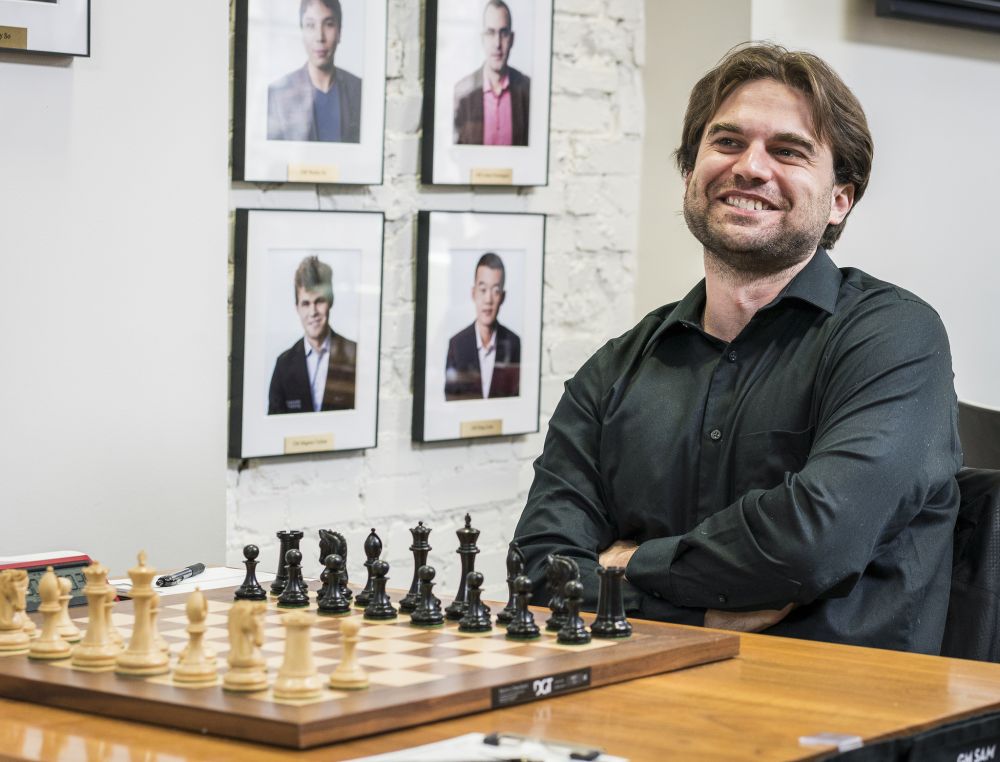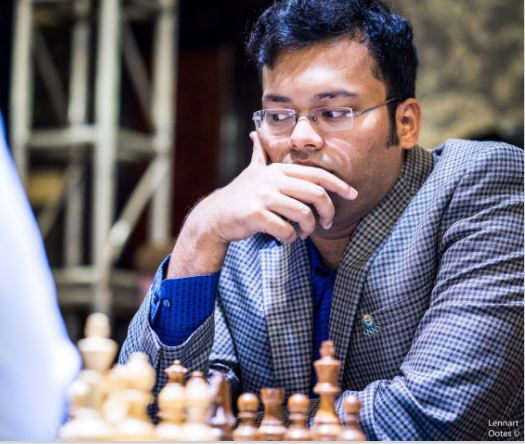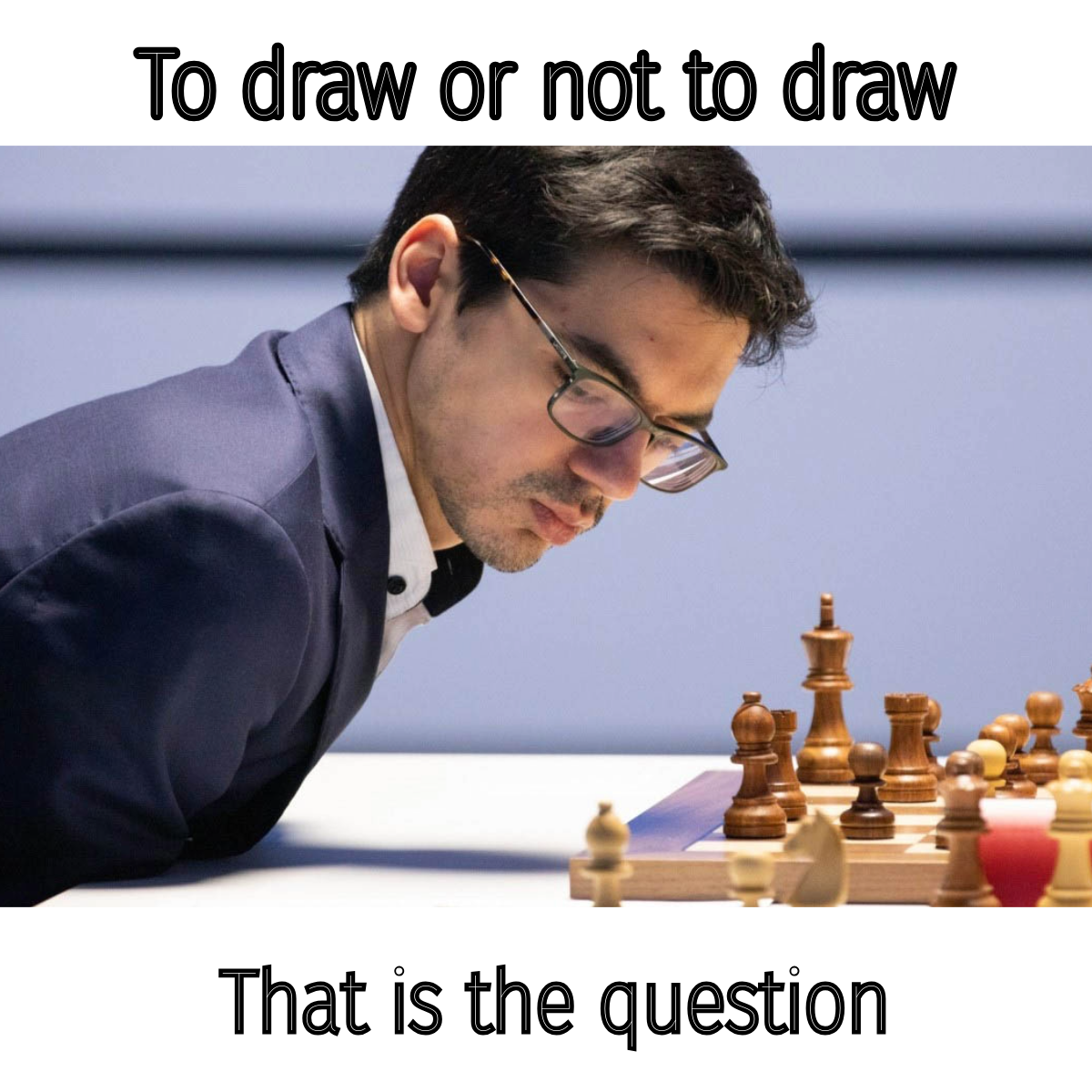Surya Ganguly takes on Sam Shankland in a Chess Match using the Venceslav Rutar scoring method
Venceslav Rutar from Slovenia is organizing a match between GM Sam Shankland and GM Surya Sekhar Ganguly on the 2nd and 3rd of September. What's so special about this event? As Venceslav says "Draws are not the problem. The problem is how we score them!" A unique scoring system will be used in this match - The traditional 1 (to the winner), ½ (to both the players) and 0 (to the loser) points are replaced by five possibilities: Win, Favored Draw, Equal Draw, Disfavored Draw, and loss. The match will take place on 2nd and 3rd September 2024. The format, details, scoring system, and all other details can be found on the article below - the match will be streamed live on the ChessBase India YouTube Channel from 8:30 PM IST on 2nd September!
In every big tournament, we observe that many games often end up in a draw. Since no player would want to lose the game, they play extra cautiously. This safe approach from the players often results in a draw. Though it shows the perfection and accuracy of both the players, fans find it ‘boring’ to watch. Be it the World Championship Match between Carlsen-Caruana in which all the classical games concluded in a draw or Ding-Ian in which the score was 7:7, fans were quite unhappy to see many indecisive games. From the media's point of view, decisive results mean more publicity! The Carlsen-Caruana match received low publicity for this reason. Some organizers tried implementing ‘Soccer scoring’ which gives 3 points for a win and only 1 point for a draw hoping to see more decisive results. In most of the tournaments, we see tiebreaks of faster time controls. However, these methods did not bring any significant difference in the number of decisive games.
In many games, none of the players blunder wherein a draw makes sense. Of course, there are so many cases of ‘Grandmaster draw’ when none of the players try any creative combination of moves and settle for a draw. Fans often expect unthinkable moves from great players because that makes the game interesting. There were a lot of instances in the past where a player came up with a move that totally changed the ‘Draw-ish’ situation and dominated the game. If the tournament winner is already known, then a draw might be understandable. But when it happens right from the start of any big tournament, it’s natural that fans get disappointed.
Draws are not the problem. The problem is how we score them. -Venceslav Rutar
Venceslav Rutar from Slovenia is organizing a match between GM Sam Shankland and GM Surya Sekhar Ganguly on the 2nd and 3rd of September.
About Venceslav Rutar
Venceslav Rutar is a PhD Scientist who contributed to the development of Nuclear Magnetic Resonance. His years of great findings are applied in Physics, Chemistry, Agronomy, and other disciplines. His education was in Technical Physics and he worked as a teacher for some period. After his retirement, he lives with his family in the USA and his native place Slovenia. He started playing chess as a child, but he focused more on his studies since he found that more important. Later on, he restarted his chess career and even reached his highest rating of 2165 under the US Chess Federation. Since then, he has been a religious chess fan.

What is so special about this event?
The scoring system! Today, there are countless variations of chess right from the pieces to the rules. This is the first time that any scoring system is developed which focuses on a draw. The traditional scoring system divides the points equally between the two players. This rule has been followed for more than centuries. Draws are an integral part of chess and we cannot eliminate them ever. While no one can really convince the players to fight for a win, one person decided to change the rules! He created such rules that would make players fight for a win!
If they can’t win the game, change the rules!
The traditional 1 (to the winner), ½ (to both the players), and 0 (to the loser) points are replaced by five possibilities:
| Outcome | Points | Abbreviation |
| Win | 5 | W |
| Favored Draw | 3 | F |
| Equal Draw | 2 | E |
| Disfavoured Draw | 1 | D |
| Loss | 0 | L |
Points for the winner and loser are self-explanatory. But, when the game is declared as a draw, the tournament director will count all the pieces on the board. The material balance will be calculated by adding values as follows:
| Piece | Points |
| Pawn | 1 |
| Knight | 3 |
| Bishop | 3 |
| Rook | 5 |
| Queen | 9 |
The player who has more pieces on the board (material advantage) will get 3 points (Favoured draw) and the other player will get 1 point (Disfavoured Draw). If the material advantage is the same for both players, then both will get 2 points.
Let’s see some draw scenarios to understand this better:
| Scenario | Result |
| Rook against Bishop | Favoured Draw (5 vs 3) |
| Rook against Bishop + Pawn | Favoured Draw (5 vs 4) |
| Rook against Bishop + 2 Pawns | Equal Draw (5 vs 5) |
| Rook against Bishop + 3 Pawns | Firstly, why will the player accept the draw? |
This system does not change the following possibilities that result in a draw:
-Agreement between players
-Bare kings
-Stalemate
-3-fold repetition
-50 reversible moves in a row
What about the “timeout vs insufficient material”?
Let’s consider two scenarios to understand this.
1) Player A has only one bishop and Player B has only one knight. If player A flags, then he will get 1 point (Disfavoured Draw) because he ran out of time and player B will get 2 points (Equal Draw) because of equal material.
2) Player C has one knight and Player D has a king only. If player C flags, then he will get 1 point (Disfavoured Draw) because he ran out of time and player D will also get 1 point (Disfavoured Draw) because of insufficient material.
Why this system?
If we take a closer look at the drawn games, we will notice that sometimes giving half a point to both players appears unfair. A draw might be unfair in the following two situations:
1) Sometimes a player might have a clear advantage on the board with material advantage, but still end up in a stalemate / 3-fold repetition situation.
2)A player with a winning position might run out of time but still draw due to insufficient material on the opponent’s side. This can be unfair to the player having a winning position.
This scoring system tries to bring justice in such unjust situations.
We must accept that all draws are not equal.
Know what Venceslav Rutar has to say about this:
Complaints about boring draws still persist. That’s why I believe a different scoring system will make the games interesting. Players will have to adapt to this scoring system. We will see how the theories and tactical considerations change after implementing this. Games will become more complex but this will bring a fresh perspective to this ancient game. We can also create variants of this scoring system in the future. This will be the first step towards eventual implementation of my scoring in official competitions. I would appreciate it if players and viewers share their opinion on this.
What this scoring system will bring about?
Theoretical draws with material imbalance or stalemate can be avoided with this system. The weaker side will not get the same point thereby giving justice to the stronger side.
2) More decided games:
Since favored draws occur more frequently in the tournaments, we will see a number of decided games.
3) Better players are rewarded:
When one player strongly plays for a win, the other player escapes the trap to make a draw and the game can end with material disadvantage. This scoring system will favour the player who plays better.
4) No delay in long events:
If we don’t get the winner after the regular matches, tiebreaks become necessary. This is seen in a lot of events. This system will decrease the probability that matches remain tied.
5) Fear of disfavoured draw:
After implementing this system, players will hesitate to sacrifice materials to make a draw. They know that even if they draw the game, they might get fewer points due to a disfavoured draw. Due to this fear, they will start to play for a win right from the start.
6) More excitement for fans:
More fights on the board means more drama for the fans. Decided games will increase the number of followers and eventually lead to increased viewership, media attention and corporate sponsorships.
Venceslav Rutar sent invitations for this match to some strong grandmasters. He found GM Sam Shankland’s response the most enthusiastic. Then Sam recommended GM Surya Shekhar Ganguly as his potential opponent. That’s how these two were selected.
What do the players think about this event?
Reason behind participation
GM Sam Shankland:
As a chess lover, I find this new concept very interesting! We definitely have problems with draws and theories. Though there have been several efforts done to use different scoring methods to counter this, we did not see much positive results. I love that Venceslav decided to test this idea in an unrated friendly match. This shows a great dedication on his part.

GM Surya Ganguly:
Sam and I have been very good friends for years. He has been to Kolkata many times and I have been to his place in San Francisco. Also, we have been training together for years. One day he messaged me to see if I was interested in this kind of match. The format seemed very interesting. It definitely gives food for thought. Many things will change because of this format. So, I thought of giving it a try.

Impact of this scoring system on regular chess
GM Sam Shankland:
This system will encourage the black player to choose riskier lines and the white player to choose less risky lines. It will also be interesting to see what will happen in the endgames. The attacking side will have to make a judgment call on whether to aim for the full 5 points or to content themselves with a favoured draw and the defending side will have to choose between a disfavoured draw or an equal draw. My suspicion is that the new scoring system will almost never produce a match or tournament winner different from what a classical scoring system would, but if the classical scoring system were otherwise tied, Venceslav's system would not be.
GM Surya Ganguly:
Interesting thing is that the chess rules will remain the same. But when the players will agree for a draw, the player with higher material will get advantage. Our main concern is that all our endgame knowledge will change. Not a single endgame theory will work in this format. It definitely makes it harder for black and white will be happy to get even a small pull. So, I am very curious to see how things will work.
Overall impressions about this system
GM Sam Shankland:
I am coming in with an open mind. It might turn out to be genius and become the best way to score chess games, it might turn out to work terribly and never be tried again, or anything in between. So, I am neither endorsing it nor condemning it until it has been tried and tested. I will be much more able to give a better-informed opinion once the match is over and I get a sense of how it feels to play under these conditions. For now, I will just say that it sounds interesting, and I am really looking forward to the match!
GM Surya Ganguly:
I think we will have to test this system on a trial-and-error basis. We can have many variants but classical chess will always remain classical chess. This certainly gives a fresh perspective to the game. It will be exciting to see how the players will think. In general, I am very curious to play against Sam and to understand how we will approach the game.
In the end, players will be left with only one question...

The Format of the Match
The match will take place on 2nd and 3rd September 2024. The games will start each day from 8:30 PM IST - there will be four games played between Surya and Sam each day, with the time control of 15 minutes + 5 second increment starting from the first move.





